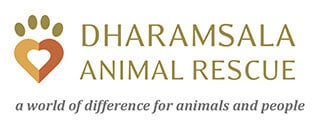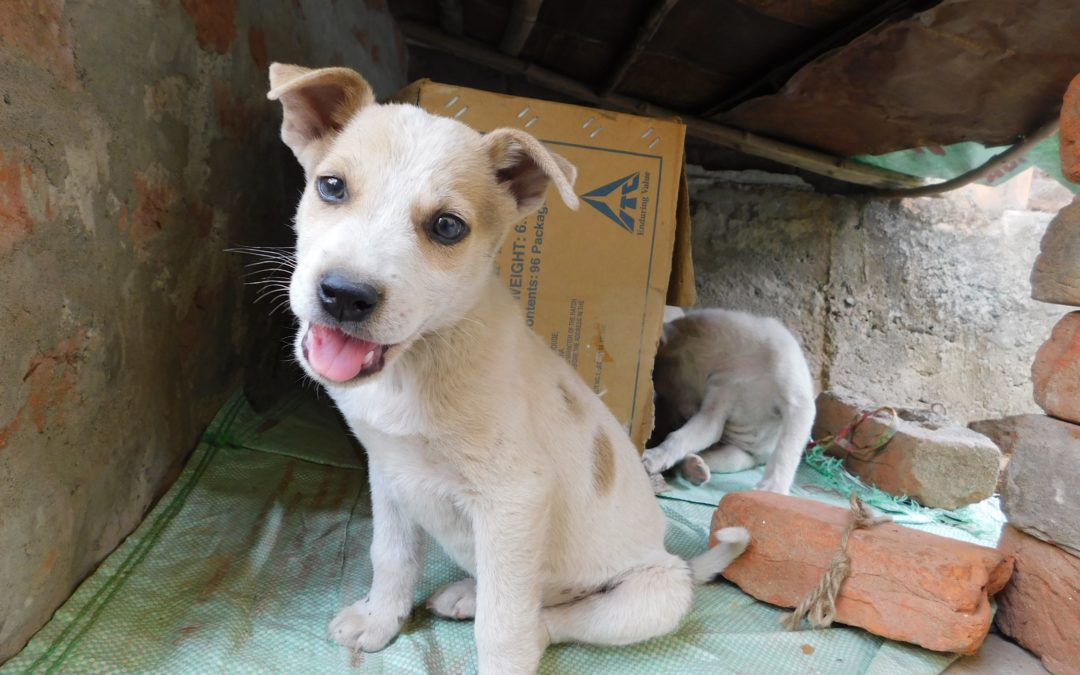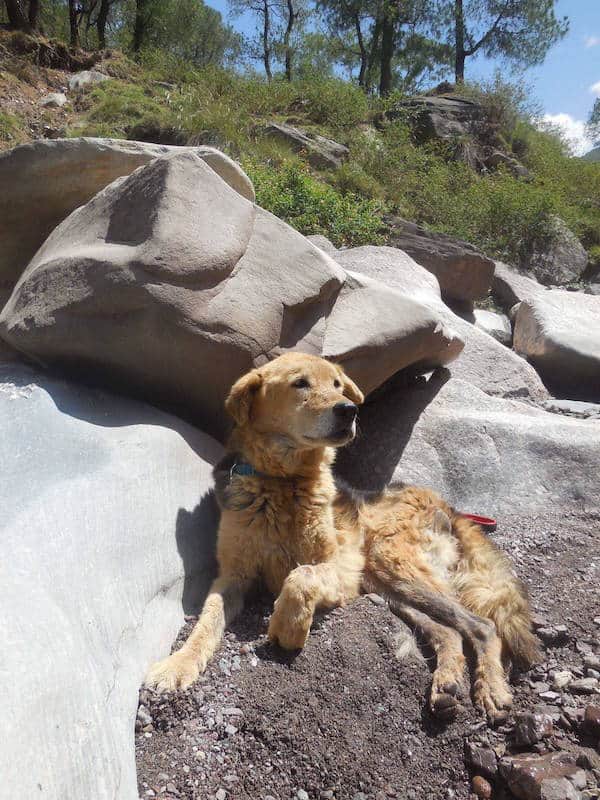An Australian Buddhist nun working as a volunteer at an animal rescue in India? Stranger things have been known to happen.
When I first moved to Dharamsala in northern India, I assumed that my days would be fixed around my studies. That was the reason why I came in the first place. Prior to this, I had been working in a Dharma centre, as part of a team; now I was living by myself in a place I had never been before. I felt the lack of the team environment. It is human to gravitate towards that which we know, whether we recognise it or not.
I was drawn in by the gravitational pull of Dharamsala Animal Rescue. I decided to volunteer for two weeks, and then once a week on Saturdays after that. I had already committed to adopting one of their elderly rescues. Jimmy was a lovely ex-street dog who sometimes volunteered with me. She would also howl nonstop whenever a task required me to leave her alone. Oh gosh… but Jimmy is another story….
Being an introvert, my first day was filled with awkward thoughts about what to do, what to say, and how to help. I was fortunate enough to catch a lift to the clinic with some of the team, sitting in the backseat, hoping not to get car sick before we arrived. Less than 45 minutes later, I joined the daily morning meeting (surprisingly without vomiting). There was chai and biscuits to chug down while the project manager organized us into our particular jobs. Being an unskilled volunteer, I was given the fun jobs: walking the dogs, picking up poo, washing dog blankets―the universal newbie jobs.
Veena the vet assistant and a volunteer treat an injured dog
After the meeting, everyone got down to business. It was time to give the dogs their morning treatments. I followed Veena (vet assistant) around like a puppy, watching her skilfully coax a shy dog to swallow a bright pink vitamin supplement. Sounds easy, yes? When I attempted to do it myself, the ground became the equivalent of a pink Pro Hart painting, as did my hands. These guys have skills, I thought. Morning treatments took a while, with more than forty dogs to treat. But everything happened at an easy pace―there was no expectation that every moment should be accounted for in the busy, capitalist-inspired way we have in the West.
Once everyone had swallowed their pink paste, we separated into smaller working groups. Some of the DAR team headed into the treatment room to treat serious injuries; others went to the office, and I joined the dog-hike group. This quickly became one of my favourite tasks. The insanely cheery dogs went walking in their own assigned groups―seniors, permanent residents, and puppies in training. Sandy, one of the seniors, always walked at her own pace. She had arthritis in her back legs that, at times, left her struggling to walk. Regardless, she was always keen to stop and survey the fabulous view of Rakkar village and the valley beyond. I often wondered what she thought about in those moments.
Sandy
My other favourites were Beauty, Coconut, and Mutki. They were the embodiment of Energiser bunnies, forcefully pulling me in three different directions while making loud comments on things nearby. Walking the three of them meant working at maximum capacity. I quickly discovered that it was a practice of mindfulness concerning legs and leashes. You did not want to have a leash in the vicinity of your legs when one of them decided to chase something.
The afternoons were filled with more hiking, cleaning blankets, or picking up poo in the dog zones. The mobile clinic headed off to treat non-DAR dogs in the Dharamsala region and they often weren’t back till after 5pm.
The mid-afternoon chai break would see some of us sitting beneath the shady trees. Others would power on through the break. One of my favourite moments was watching Veena sit with her two daughters, talking quietly. DAR is certianly a family affair. This extended moment of leisure was accompanied by the silence of sleeping dogs. Everyone with four legs passed out as the sun passed over.
My personal worries about being lazy were forgotten as soon as the time came for afternoon feeds. What a cacophony of howls, yips, barks, and cries! Overexcited puppies fell over each other; dogs with medical collars became opera singers; canine teenagers insisted it was their turn first! Only the seniors waited quietly, swaying on their feet from age or arthritis. It went on for an hour at least, and then it was like someone flicked a switch. Full stomachs meant heavy minds and by the time 5.30pm came, snoring bodies were strewn across the earth.
Lozang Khadro with Roti the puppy
Sometimes there were extra treatments to be given or last minute rescues to take care of. The project manager, vet, and assistants would disappear into the treatment room and not resurface for some time. Once everyone had been seen, this same room would be transformed into a sleeping area. All of the dogs were moved inside to prevent escapes or night time operas. Only then would we head off home, leaving the night attendant upstairs―often sharing his room with a needy puppy.
I was usually exhausted when I got home, but was I always the recipient of copious thanks from the team. This outpouring of gratitude for an unskilled volunteer was heartening. Their gratitude fed my gratitude. It was good to be involved in something that was outside of my usual routine. I realised this was a privilege in its own right. What a list of privileges I had!
Words: Lozang Khadro
Images: Dan Rigby
Editing: Sharnon Mentor-King
Get our best articles straight to your inbox.
Subscribe to The DARling below:
About the author

Lozang Khadro
Lozang Khadro has been an ordained cat-lover in the Tibetan Buddhist tradition for seven years, four of which she has lived in India. Her hobbies include reading, watching The X Files, learning with the purpose of challenging her incorrect assumptions, and asking her cats if they need anything.
She believes an altruistic motivation is the best moral compass we can have. Her favourite modern saying is by Imam Afroz Ali, and she believes it is much needed in the world today: ‘Even if you do not like or respect the behaviour or words of another, you must respect them because we are all the same.’




